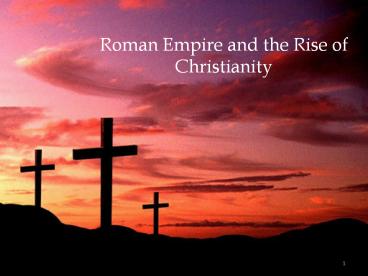Roman Empire and the Rise of Christianity PowerPoint PPT Presentation
Title: Roman Empire and the Rise of Christianity
1
Roman Empire and the Rise of Christianity
2
The Roman Empire
- Augustus is the first Roman Emperor
- Augustus wore a crown and the color purple (the
most expensive color at the time) - Augustus was a great ruler but he produced some
pretty terrible offspring. - I inherited a city of bricks and made it a city
of Marble Augustus
3
You probably Wouldnt Want to Be Emperor
- Augustuss Decedents
- Tiberius-Murdered
- Caligula-Assassinated by his own body guards
- Claudius-Poisoned by his own wife.
- Nero- Most Crazy Emperor of all.
4
Nero (Crazy Nero)
What and artist dies in me
- Ruled jointly with his mother (Had a problem with
sharing power) - Tries to kill his mother by sinking her boat.
(she swam to shore) - Murder two wives (Kicked one to death while she
was pregnant. - Finally his army had enough and tried to kill
him. - He eventually stabbed himself.
5
Pax Romana
- Pax Romana-Roman Peace
- was the long period of relative peace and minimal
expansion by military force experienced by the
Roman Empire in the 1st and 2nd centuries.
6
Christianity
- Early on in Pax Romana, a new religion,
Christianity emerged in a distant corner of the
Empire - Many different religions in the empire
- By 63 B.C., Romans had conquered Judea where most
Jewish people lived.
7
Roman Occupation of Judah
- Romans allowed Jewish people to worship their one
god - Many Jews reluctantly lived under Roman rule,
however, some wanted a revolt against Rome and
believed a messiah would come to lead their
people to freedom
8
Jesus
-Born in 4 B.C. in Bethlehem -worshipped God and
followed Jewish law -at 30 began preaching to
villagers, used parables-short stories with
simple moral lessons to communicate his
ideas -Recruited 12 disciples to help him spread
his ideas, called apostles, in Jerusalem -Some
Jews in Jerusalem welcomed Jesus, many of the
priests felt he threatened their
leadership -Roman authorities felt Jesus would
lead the Jews in a revolt against their rule
9
Death of Jesus
-According to the gospels, Jesus was betrayed by
one of his disciples, arrested by the Romans, and
killed by crucifixion-a person was bound to a
cross and left to die
-Rumors then spread that Jesus had not died but
had risen from death and commanded his disciples
to spread his teachings -After the disciples
reported he ascended into heaven
10
Christianity Spreads
-Followers called Christians -Disciples preach
the messages of Christianity throughout the Roman
world -Peter established Christianity in Rome
itself -Paul played the most influential role in
spreading Christianity
-His letters became part of the New Testament
in the Bible
11
Christians Oppressed
-Romans were not tolerant towards Christians
because -they refused to honor the emperor with
sacrifices -they refused to worship Roman gods
to protect the state -Christians were used as
scapegoats, blamed for social and economic
problems -Many Christians became martyrs- or
people who suffer or die for their
beliefs -However, Christianity continued to
spread due to the fact that all people were
welcome
12
(No Transcript)
13
Key Beliefs Christianity
- Christians believe that Jesus was the Messiah
promised in the Old Testament and the Son of God.
- Christians believe that God sent his Son to earth
to save humanity of its sins. - One of the most important concepts in
Christianity is that of Jesus giving his life on
the Cross and rising from the dead on the third
day (the Resurrection). - Christians believe that there is only one God,
but that there are three elements to this one
God (Trinity) - God the Father
- God the Son
- The Holy Spirit
14
Early Christian Church
- Emperor Constantine issued the Edict of Milan in
A.D. 313.
- The Edict granted freedom of worship to all
citizens of the Roman empire
- By the end of the century, Emperor Theodosius
made Christianity the official religion of the
Roman empire
15
Structure of the Church
The Christian Clergy
Pope
Bishop Bishop Bishop
Diocese Priest Community Diocese Priest Community Diocese Priest Community

